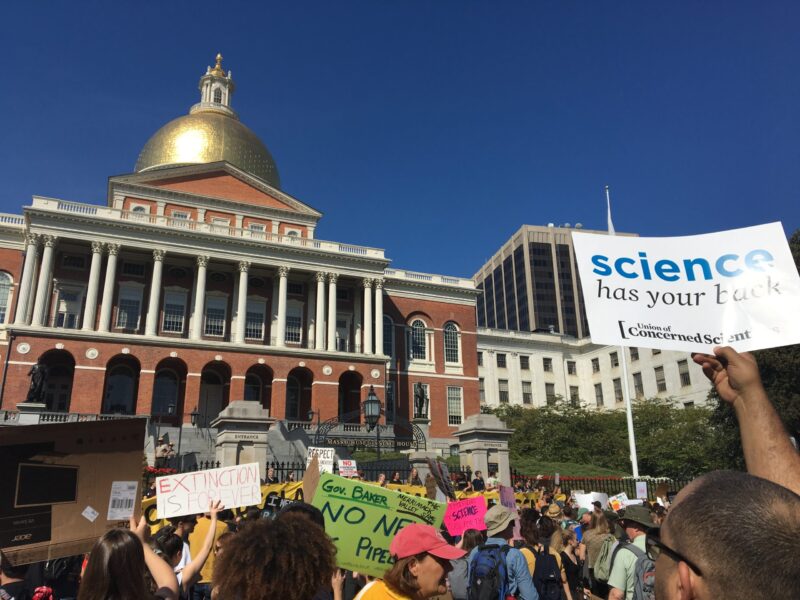UPDATE, 8/11/22. Success: We have a law!
The latest heat waves have only reminded me of the world to come if we don’t take decisive action to address climate change now. That’s why I applaud that, on Thursday, the Massachusetts legislature sent Governor Baker a highly anticipated Climate and Energy bill, and we are hoping he signs it by the deadline, July 31.
Here is why Governor Baker’s prompt signature on the bill, “An Act Driving Clean Energy and Offshore Wind,” matters now more than ever.
What’s good about the bill and why
The bill has numerous important pieces that are needed to advance an equitable clean energy economy and transition away from fossil fuels. These include:
- Clean electricity. The bill recognizes that workforce development is a key to propelling the Commonwealth’s nascent offshore wind industry and it gives the Massachusetts Clean Energy Center a central role in advancing research and innovation. It also advances an inclusive and equitable workforce by giving more weight to projects that support workforce agreements with labor organizations, provide employment opportunities to low-income and minority workers, and support other social and environmental benefits. Equally important, the bill removes barriers to access for rooftop solar and instructs the Department of Energy Resources to conduct a study on energy storage that could result in the solicitation of up to 4,800 gigawatt-hours (an outstanding increase from the current target). All these pieces are vital for moving us closer to a future where the electrons that power our economy come from clean sources.
- Clean transportation. The bill offers rebates at point-of-sale for electric vehicles (EVs); this is huge! No more waiting to get a rebate check – which is often a limiting factor in purchasing an EV. The bill also provides up to $5000 in rebates, with an additional $1500 for low-income individuals, for the purchase of EVs less than $55,000. Among other elements, the bill also calls for the MBTA bus fleet to be 100% electrified by 2040, with priority deployment of zero-emission buses on routes that pass through environmental justice communities.
- Moving away from fossil fuels. Moving to clean energy needs to be paired with explicit actions to cut our dependence on fossil fuels. That’s why it is great to see that the bill requires Mass Save to stop providing rebates for heating and cooling systems powered by fossil fuels starting in 2025 (unless these systems are used as backup). Additionally, it brings accountability and transparency to the ongoing study on the future of gas led by Department of Public Utilities, by ensuring that this study is no longer only informed by the utilities and that other actors have a say in the planning process.
What’s next: more ambition
I believe that the Massachusetts legislature understands the challenge involved in addressing the climate, health, and economic crises we are facing. And the only way to effectively address these crises is through sustained action. That’s why in the next legislative session I really hope to see:
- Strong requirements to transition to a 100% renewable electricity standard (RES) by 2035. Our own analysis found that this is technically feasible, even as we electrify buildings and transportation. Meeting 100% of the state’s electricity needs with renewables by 2035 can bring multiple benefits, including an 85 percent drop in heat-trapping emissions from the power sector, more than 45,000 additional jobs, and $13 billion in additional growth of the state’s GDP by 2040.
- Smart investments to continue to move our transit system away from fossil-fuels. It is crucial to set interim and 100% electrification targets for the commuter rail system – a network of trains that continue to rely on diesel fuel to power the engines. Diesel pollution is deeply health-damaging and adds to the already existing burden of vehicle pollution in environmental justice communities.
- Strategic commitments to increase air quality monitoring. Clean energy and transportation are about much more than just generation and reductions in heat-trapping emissions. We should recognize the detrimental impact that many of our fossil-fuel options have on the health of communities impacted by air pollution. For example, a recent UCS study found that communities of color across the Commonwealth are exposed to at least 30% more local air pollution from on-road transportation sources. This is unacceptable. To start to address this situation, it’s crucial to increase publicly available air quality monitoring in pollution hotspots and corridors so that we can track progress in targeted interventions and realize the greatest improvements for residents most burdened by harmful localized air pollution.
Action needed NOW

As I mentioned before, sustained action is crucial, and this bill offers exactly just that. Standing idly while seeing the impact that climate change is already having on our lives is NOT an option.
Governor Baker: it’s imperative to halt our heat-trapping emissions. We need to clean the air we breathe, and we need a vibrant economy where we can all thrive. The ball is in your court, please sign the bill!

